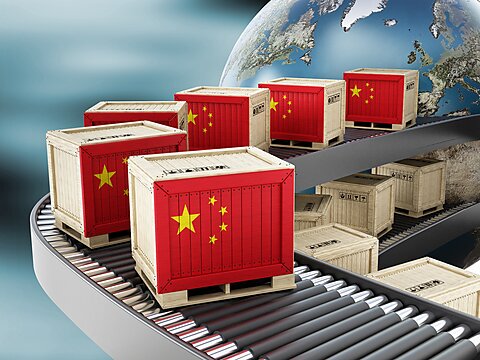The US-China relationship is the most important and complex bilateral relationship in the world today. How these two superpowers interact is a paramount concern for the future of global peace and prosperity. Though Washington and Beijing have never seen eye-to-eye on many issues, the two superpowers were both largely supportive (for a while at least) of global economic integration. Today, that is no longer the case. Trade and investment have become subordinated to broader concerns about national security and geopolitics as tensions ratchet upward.
In light of the increasingly contentious nature of the US-China relationship, it is worth examining Americans’ views about economic ties between the two countries. Fortunately, recent Cato Institute polling data (full survey crosstabs (XLS)) covers this very topic. Here are the China-specific results:
55 percent of survey respondents agree that “The US trading with China helps increase global stability and peace” versus 45 percent who disagree. Specifically, 11 percent strongly agree and 45 percent somewhat agree; 29 percent somewhat disagree and 16 percent strongly disagree.
Digging into the crosstabs, it is clear there is a strong partisan split on this question. Sixty-eight percent of Democrats and those who lean Democratic agree that the US-China trading relationship helps increase global stability and peace versus 45 percent of Republicans and those leaning Republican. 45 percent of independents also agreed with the statement.
The next China-related question asked respondents whether China generally practices fair or unfair trade with the United States. Fifteen percent of those surveyed said China practices mostly fair trade with the US versus 59 percent who believe China practices mostly unfair trade. Another 25 percent said they didn’t know.
Unlike the previous China question about global stability and peace, there isn’t much of a partisan split on this issue. Twenty percent of Democrats/those leaning Democratic, 10 percent of independents, and 13 percent of Republicans/those leaning Republican believe China practices largely fair trade with the United States. In comparison, 52 percent of Democrats/those leaning Democratic, 53 percent of independents, and 71 percent of Republicans/those leaning Republican believe China practices mostly unfair trade.
Cato asked respondents, “based on what you know, approximately what percent of goods imported into the United States come from China?” It turns out the overwhelming majority vastly overestimated China’s share of US goods imports: 5 percent of respondents said less than 5 percent; 13 percent said 15 percent (the correct answer); 31 percent said 25 percent; 28 percent said 50 percent, 18 percent said 75 percent and 4 percent said 95 percent. There’s not much of a partisan split on this question.
The last question is straightforward enough—and the respondents’ overestimates are understandable given US policymakers’ overwhelming focus on China when discussing matters of international economic policy—but the first two are more nuanced, so let’s dig in.
First, there is a large body of scholarly work about whether economic integration tends to reduce conflict and helps facilitate peace and stability between trading partners. This idea can be traced at least as far back as Montesquieu who wrote in the 1700s that peace is the “natural effect of trade.” This belief has been a pillar of U.S. international economic policy—and foreign policy more broadly–since the leadership of Secretary of State Cordell Hull in the 1930s and especially in the aftermath of World War II.
While I’m inclined to think the American public’s instincts are correct and trade does tend to promote peace, it’s also clearly not a panacea given prominent counterexamples (including World War I and Russia’s 2022 invasion of Ukraine). That said, policymakers pushing for a hard decoupling with China risk a greater likelihood of conflict.
On the issue of abusive Chinese trading practices, public skepticism is well-founded. The issue, however, is complicated. Although it’s true Beijing engages in numerous troublesome international economic practices that hurt American firms (which my Cato colleague Scott Lincicome and I documented in a paper last year), a lot of US-China trade is fairly conducted. That said, even though policymakers have (largely) diagnosed the problems correctly, their “solutions” have done little to alter Beijing’s behavior while imposing substantial costs on American citizens. A course change is desperately needed.
The US and China trade a lot with one another, but, ultimately, two-way trade (imports and exports) with China is just 11 percent of all US trade. As Lincicome recently noted, “contrary to so much of the protectionist spin you read these days … the vast majority of US trade (goods and services; imports and exports) involves countries other than China.” Indeed, too often China is invoked as a pretext for old-fashioned protectionism against other countries. Yet the American public largely supports more trade with the rest of the world (55 percent of poll respondents had a positive opinion of international trade compared to 12 percent unfavorable), particularly allied countries.
More broadly, Cato’s poll results demonstrate that Americans generally do not worry too much about international trade and globalization. A mere 1 percent of respondents said that international trade was in the top three most important issues facing them (perhaps surprising given the rhetoric from Donald Trump’s presidential campaign, which has focused heavily on across-the-board protectionism).
Yet Cato’s polling shows that aggressive protectionism is not popular with the American public, especially if it comes with higher prices and other tangible costs (spoilers: it does). Politicians hoping to appeal to Americans on the issue of international trade should focus their efforts on boosting trade ties with friendly nations not pushing unpopular protectionism.












